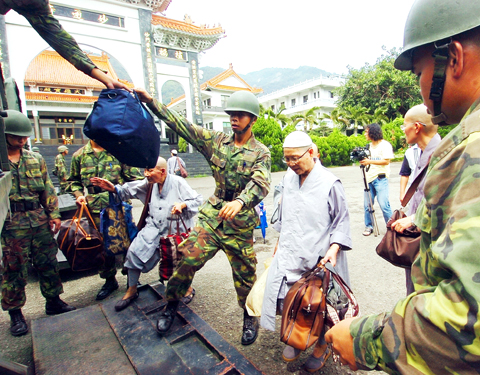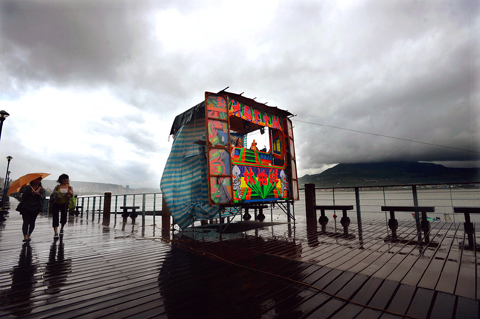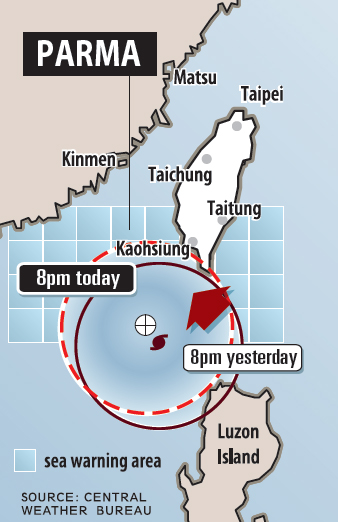The Central Weather Bureau (CWB) issued a land warning for Typhoon Parma in the Hengchun Peninsula yesterday and said the storm would bring strong winds and heavy rain as it made a slow approach north.
The weather system, with winds gusting up to 155kph, was 270km south of Oluanbi (鵝鑾鼻) as of 9:15pm, moving slowly in a north-northwesterly direction, the bureau said.
“The typhoon is forecast to move along the [northern] track until Monday night and then turn southwest,” CWB forecaster Hsiao Chia-sen (蕭家森) said. “In the next two to three days, the typhoon may move slowly and hover around the Bashi Channel.”

PHOTO: HUANG CHIH-YUAN, TAIPEI TIMES
He urged residents of Hengchun Township (恆春) to take precautions against powerful winds and rains.
Residents in northern and eastern parts of Taiwan should also be on guard against heavy rains brought by the typhoon, he said.
Authorities suspended air and sea links with outlying islands yesterday and about 55 international flights were either canceled or delayed.

PHOTO: LIN CHENG-KUNG, TAIPEI TIMES
The Directorate General of Highways was closely monitoring 60 highways, including roads leading to Alishan and the Southern Cross-Island Highway.
The roads would be closed if necessary, it said.
Following criticism of the government’s handling of Typhoon Morakot and its aftermath, authorities started evacuations in four central and southern counties on Saturday after the weather bureau said the typhoon could bring torrential rains and trigger landslides.

Evacuation from potentially hazardous areas — especially those devastated by Morakot — continued as strong winds and rain brought by the approaching typhoon began in parts of the country yesterday. Evacuation of more than 400 residents in Laiji Village (來吉) and Alishan Township (阿里山) in Chiayi County began early yesterday morning after the bureau issued the first land warning for Parma.
Laiji, as well as several other villages in the region, was completely cut off in August as all the roads leading to the mountainous village were damaged by mudslides triggered by rains brought by Morakot. The roads remained damaged for nearly a month and the villages relied on helicopters and manpower for food and other necessities.
Fearing a repeat scenario, residents in those parts of the country most devastated in August were more eager to evacuate this time, police and rescue workers said, adding that many had already left before evacuation orders were issued.
At press time, 440 Laiji villagers were staying in temples and army bases in Chiayi. The Chiayi County Government said it planned to evacuate 2,629 people and had set up 30 shelters across the country.
Meanwhile, the Kaohsiung County Government said it had evacuated more than 700 people from potentially hazardous areas including Liouguei (六龜), Taoyuan (桃源), Maolin (茂林), Jiasian (甲仙) and Namasiya townships.
People were also evacuated from Nantou, Pingtung and Taitung counties.
Although most people cooperated with evacuation orders, a 92-year-old woman in Shenmu Village (神木), Nantou County’s Sinyi Township (信義), initially refused to leave.
“I don’t want to leave, I’ve never left the village, it’s safe here,” the woman told the village chief and rescue workers when they visited her house and asked her to leave.
She only agreed after hours of persuasion by her children and grandchildren.
The Ministry of National Defense also deployed some 200 soldiers from elite units to remote villages while putting 35,000 on standby.
At a press conference held at the Central Emergency Operation Center yesterday, Premier Wu Den-yih (吳敦義) said he had told the Pingtung County Government to draw up measures to prevent people from surfing, fishing and watching the waves along the coast.
He said he had ordered the Water Resources Agency to cooperate with the Taitung and Pingtung county governments in dredging rivers in eastern Taiwan ahead of the typhoon.
Wu said President Ma Ying-jeou (馬英九) was very concerned about possible damage if the typhoon brought torrential rain.
The CWB dispatched 25 weather experts to assist local emergency operation centers, Wu said.
“If it turns out that the typhoon spares us, the entire country will have held a thorough [disaster prevention] drill,” Wu said.
“And if the typhoon does hit, we need to mitigate the damage it causes,” he said.
While the Taipei City Government has stockpiled sandbags for residents to keep floodwater from reaching their homes, Taipei Mayor Hau Lung-bin (郝龍斌) said it was unlikely that the city would declare a typhoon day today because the rainfall in Taipei had not exceeded the city’s standard for closing workplaces and schools — 78mm per hour.
At press time, Pingtung County’s Hengchun, Checheng (車城), Manjhou (滿州), Fangshan (枋山), Shihzih (獅子) and Mutan (牡丹) townships, Taitung County’s Daren Township (達仁) were the only ones declaring today a typhoon day, canceling work and classes.
Wu also warned of possible mudslides in Hualien after a major earthquake off the coast of Hualien early yesterday morning.
While the bureau put the magnitude at 6.3 on the Richter scale, the US Geological Survey said it was 6.1, after first gauging it at 6.2.
The survey said the quake, which struck at 1:36am yesterday, was centered about 29km south of Hualien.
It was strong enough to wake some people in Taipei.
“We do not have reports of casualties or damage,” an official from the CWB said.
The bureau warned residents in coastal areas to be on the lookout for large waves, but did not issue a tsunami warning.
“Judging from the [mudslide] situations after the 921 Earthquake [on Sept. 29, 1999], earthquakes could induce more landslides,” Wu said.

INVESTIGATION: The case is the latest instance of a DPP figure being implicated in an espionage network accused of allegedly leaking information to Chinese intelligence Democratic Progressive Party (DPP) member Ho Jen-chieh (何仁傑) was detained and held incommunicado yesterday on suspicion of spying for China during his tenure as assistant to then-minister of foreign affairs Joseph Wu (吳釗燮). The Taipei District Prosecutors’ Office said Ho was implicated during its investigation into alleged spying activities by former Presidential Office consultant Wu Shang-yu (吳尚雨). Prosecutors said there is reason to believe Ho breached the National Security Act (國家安全法) by leaking classified Ministry of Foreign Affairs information to Chinese intelligence. Following interrogation, prosecutors petitioned the Taipei District Court to detain Ho, citing concerns over potential collusion or tampering of evidence. The

‘FORM OF PROTEST’: The German Institute Taipei said it was ‘shocked’ to see Nazi symbolism used in connection with political aims as it condemned the incident Sung Chien-liang (宋建樑), who led efforts to recall Democratic Progressive Party (DPP) Legislator Lee Kun-cheng (李坤城), was released on bail of NT$80,000 yesterday amid an outcry over a Nazi armband he wore to questioning the night before. Sung arrived at the New Taipei City District Prosecutors’ Office for questioning in a recall petition forgery case on Tuesday night wearing a red armband bearing a swastika, carrying a copy of Adolf Hitler’s Mein Kampf and giving a Nazi salute. Sung left the building at 1:15am without the armband and apparently covering the book with a coat. This is a serious international scandal and Chinese

Seventy percent of middle and elementary schools now conduct English classes entirely in English, the Ministry of Education said, as it encourages schools nationwide to adopt this practice Minister of Education (MOE) Cheng Ying-yao (鄭英耀) is scheduled to present a report on the government’s bilingual education policy to the Legislative Yuan’s Education and Culture Committee today. The report would outline strategies aimed at expanding access to education, reducing regional disparities and improving talent cultivation. Implementation of bilingual education policies has varied across local governments, occasionally drawing public criticism. For example, some schools have required teachers of non-English subjects to pass English proficiency

TRADE: The premier pledged safeguards on ‘Made in Taiwan’ labeling, anti-dumping measures and stricter export controls to strengthen its position in trade talks Products labeled “made in Taiwan” must be genuinely made in Taiwan, Premier Cho Jung-tai (卓榮泰) said yesterday, vowing to enforce strict safeguards against “origin laundering” and initiate anti-dumping investigations to prevent China dumping its products in Taiwan. Cho made the remarks in a discussion session with representatives from industries in Kaohsiung. In response to the US government’s recent announcement of “reciprocal” tariffs on its trading partners, President William Lai (賴清德) and Cho last week began a series of consultations with industry leaders nationwide to gather feedback and address concerns. Taiwanese and US officials held a videoconference on Friday evening to discuss the